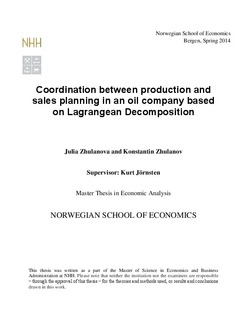| dc.description.abstract | In our work, we study the issues between production and sales
planning processes in an oil
company
. The planning problems involve
decisions regarding
procurement
of crude oil,
generation
of components
, blending of products, internal transportation
of components and
products
, operation
of depots
, and sale
s
and distri
bution
of products
to
markets
. We formulate
two separated planning problems in a decoupled setting i.e. production model solved by
the
production department (PD) and sales model solved by
the
sales department (SD). Sales planning
problem is formulated in s
everal ways, considering different scenarios for allocation of depot
operation decision and calculation of departmental premium. In addition, we consider
two
different
formulations of
re
venue functions in each of the sales
problems. The first way assume
s
q
uadratic
programming
model with linear demand function
s
,
whereas
the second
one
assume
s
a
piecewise linear approximation of
the
revenue
function
and is
a
mixed integer programming
model. The sale
s
model maximizes the premium received by
SD, whereas
the pro
duction model
minimize
s
the cost
s based on
the demand from SD. We also present integrated models
that
assume centralized planning and maximize the company's total profit. Because in many cases
integrated planning
is not possible in practice, these models
s
erve
only
as
a
theoreti
cal
benchmark
.
We assume that coordination between
the
departments is achieved through internal prices. We
propose two mechanisms for setting internal prices. The first mechanism includes two cost based
-
methods
,
whereas the second
mechanism is based on Lagrangea
n Decomposition (LD).
Then we
present numerical example to illustrate the methodologies. We study the performance of each of
the mechanisms and compare the results achieved under different scenarios. We illustrate the
potent
ial advantages and possible disadvantages of LD over the cost
-
based methods and discuss
the allocation of decision
-
making
and sharing rule
,
in which
the company attain
s
a better
outcome under the decoupled planning. | nb_NO |
